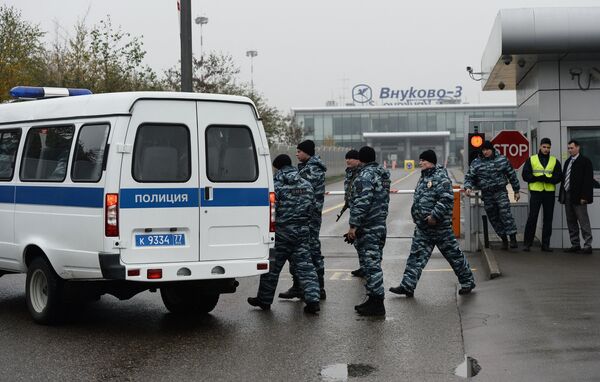Updated 4:42 p.m. Moscow Time
MOSCOW, October 21 (RIA Novosti) –Air traffic controllers at Moscow's Vnukovo Airport will be tested for alcohol and drugs in the follow up investigations into the plane crash that killed French energy giant Total's CEO when the aircraft hit a snowplow on the runway, Russian Investigative Committee Spokesman Vladimir Markin said Tuesday.
"Other versions [of the accident] are being investigated, including air traffic controller error and investigators are actively working with them, and I can say that they will also be checked on the use of alcohol and psychotropic substances," Markin said.
The Falcon 50 business jet crashed late Monday night at Vnukovo-3 Airport in Moscow when the aircraft hit a snow removal vehicle on takeoff. The aircraft was flying from Moscow to Paris with Total CEO Christophe de Margerie as the only passenger on board besides three crew members, also French citizens. All four died in the crash.
Russia's Investigative Committee is considering two main theories as to the cause of the crash - a traffic control mistake and the actions of the snowplow driver.
The Investigative Committee has detained the snowplow driver for 48 hours. Earlier, Russian investigators confirmed that the driver of the snowplow was drunk at the time of the accident. However, the driver’s lawyer told RT broadcaster that his client was sober at the time of the incident due to a heart condition preventing him from drinking.
A Vnukovo source also told RIA Novosti that the plane's taxiing shortly before the crash was coordinated by a traffic control intern.
The Interstate Aviation Committee, an air disaster investigation authority in Russia and other ex-Soviet states, announced it had set up a special commission to investigate the plane crash in Vnukovo. The committee said it had formally notified France of the crash.
The French authority responsible for safety probes into civil aviation incidents (BEA) said that it is sending three experts to Moscow to take part in an inquiry into the plane crash. BEA explained that according to international regulations, it would take part in the investigation, launched by Russian aviation safety authorities, representing the nation where the aircraft was constructed and registered.


